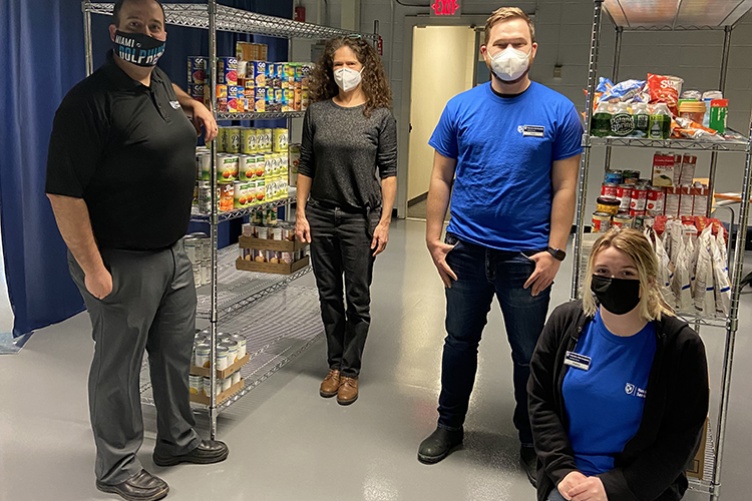
Ryan Chagnon, Rochelle L'Italien, Paul Young and Emma Owens '24 in the recently opened Cats' Cupboard food pantry in the MUB.
One floor below the bustling foot traffic of Union Court, tucked inconspicuously in a skinny hallway alongside offices for several other student groups and organizations, resides a brand-new resource launched to help UNH battle the issue of food insecurity that is affecting an increasing portion of the student population.
While many students remain free of the burden of food insecurity, a growing number of others – perhaps as many as 20 percent of students, based on results of a recent survey – are not. The newly opened Cats’ Cupboard, a food pantry exclusively for students in room 140A of the MUB, is hoping to close that gap.
Initially born out of conversations held by a basic needs support committee formed by President Dean, the pantry opened its doors Feb. 11 and currently serves visitors on Tuesdays and Fridays.
“I just go back to the idea that we are all Wildcats, and we look out for each other. I feel like this is an extension of that,” Rochelle L'Italien, a registered dietician with UNH Dining who has helped manage the coordination and opening of the pantry, says. “A core principle of this university is student well-being – food is a basic need, and this just connects us more as a community.”
The housing, food and financial support (basic needs) committee was formed in 2019 as part of the office of the dean of students, and discussions among its members about food insecurity provided the initial spark for the food pantry. Part of the ensuing process was a survey conducted toward the end of last school year, put together by members of the committee, representatives from the Hamel Scholars program, Joan Glutting, clinical professor of psychology, and Paul Young of the N.H. Food Security AmeriCorps VISTA Project.
The results were striking.
“Just under 2,000 students responded, and of those students, about one-fifth had some level of food insecurity,” Young says.
Once the need became clear, the focus shifted to making the vision a reality. The university provided initial seed money for infrastructure costs, and Cats’ Cupboard soon partnered with Gather, a Seacoast-area food pantry, to secure initial stock.
The UNH pantry has also received items from food drives coordinated by campus partners, and Young said the food pantry at St. Thomas More Parish in Durham – which runs on Thursday nights – offers anything that won’t keep between its weekly openings for distribution at UNH on Fridays and the following Tuesdays.
The ultimate plan is to partner with the New Hampshire Food Bank in Manchester due to the extensive access to resources it provides, but such a partnership requires a new pantry to establish consistent operation over some period of time. Young says he’s hoping that timeline will only be a month or two, as the New Hampshire Food Bank “is excited that the university is taking student food insecurity so seriously.”
Cats’ Cupboard launched with a variety of non-perishable “staples” available, like canned vegetables and fruits, pasta, cereal and canned tuna and chicken, as well as some bread, yogurt and sliced meats. There are also repurposed full meals available in a cooler that can be reheated.
There are a number of non-food items available for students, as well, including shampoo, shaving cream and other lifestyle essentials, as well as some assorted dishware. All resources are available to any student who needs them.
Hours of operation are currently Tuesdays from 5 to 8 p.m. and Fridays from 10 a.m. to 5 p.m., though the goal is to hopefully be open during the same business hours as the MUB at some point. L'Italien and Young have managed the formation and opening of the pantry, but Ryan Chagnon, supervisor of Union Court, will be taking over day-to-day management operations. Two student workers – one undergrad and one grad – have been hired to work in the pantry, as well.
An advisory board made up of faculty, students and other key constituents will help guide the pantry as it grows and develops. The resources are currently available for students only, but the hope is to make them available to faculty and staff down the road, as well.
“We want to make it so when you come in, you feel welcome,” Chagnon says. “This is probably a need for a lot more people than we all realize.”
Young said about a half-dozen patrons visited during the first two days of operation, and that number should only grow as word spreads about the pantry. But beyond just making essential items available to students, those involved in opening Cats’ Cupboard hope to put an end to any stigma around food insecurity, as well.
“One of the biggest things COVID has really shown us is that anybody can be food insecure, and not to judge a book by its cover,” Young says. “Just about anyone in this country is one crisis, one lost job away from needing assistance, and we’re hoping this work that we’re doing can help people understand that. It’s about overcoming that stigma and making this a more relatable and understandable issue – that this could happen to any of us at any moment.”
-
Written By:
Keith Testa | UNH Marketing | keith.testa@unh.edu
















































